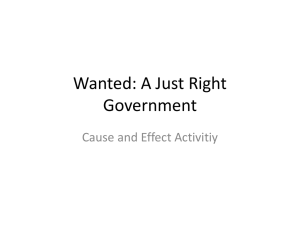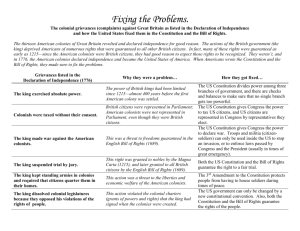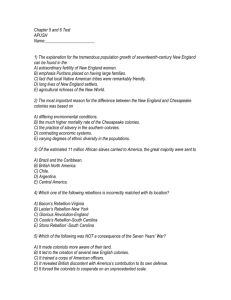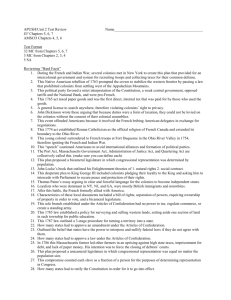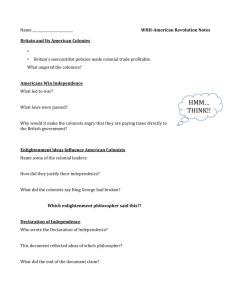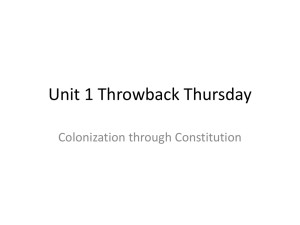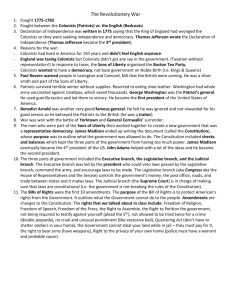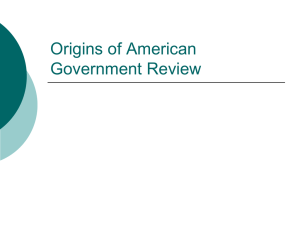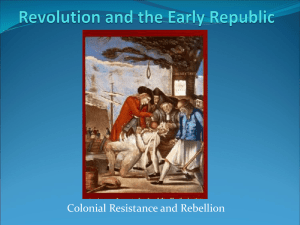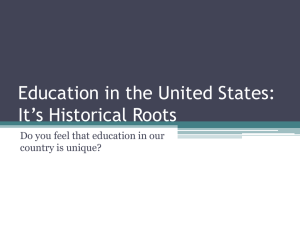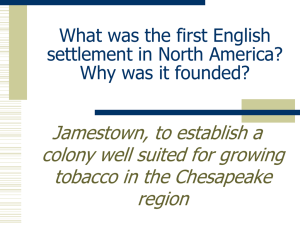File
advertisement
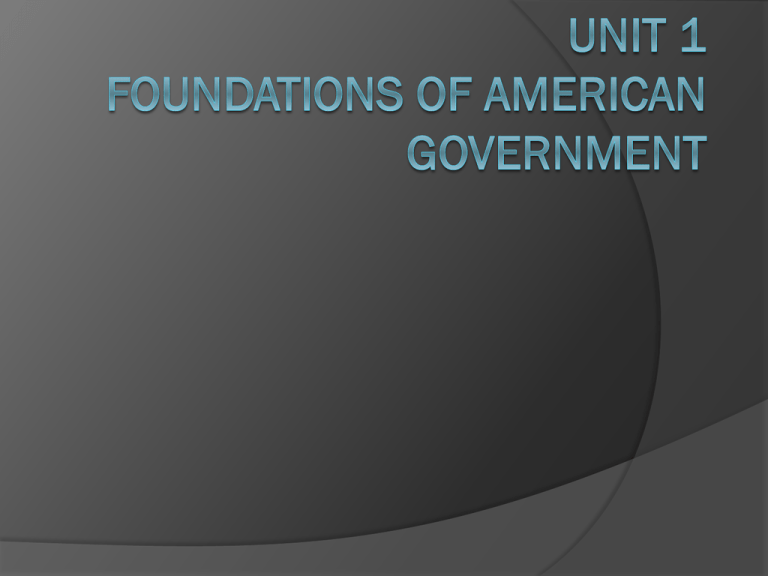
Lesson 1-1 Principles of Government Essential Features of a State A. Population, the most obvious essential feature of a state. B. An area with fixed boundaries. C. Sovereignty, or absolute authority, within its territorial boundaries. D. A government which maintains order, provides public services, and enforces decisions that its people must obey. II. Theories of the Origin of the State A. The state evolved from the family group. B. One person or a group used force to establish its authority to govern the people. C. The rulers of the people were chosen by he gods to govern. D. The people gave the government its power to rule them, and in return the government had to respect the people’s rights. III. The Purposes of Government A. Governments are needed to maintain social order by making and enforcing laws. B. Governments provide essential services for people, such as promoting public health and safety. C. Governments protect people from attack by other states and from internal threats such as terrorism. D. Governments pass law that shape and control the nation’s economy in various ways. Lesson 1.2 - The Formation of Governments I. Government Systems ○ A. A unitary system of government gives all key powers to the national or central government. ○ B. A federal system of government divides the powers of government between the national government and state or provincial governments. Unitary System Federal System II. Constitutions and Government A. A constitution is a plan that provides the rules for government. B. Whether written or unwritten, a constitution organizes the structure of government and the way it operates. C. Constitutions set out the goals and purposes of government as well as the ideals shared by the people. D. Constitutions provide the supreme law for states and their governments. III. Politics and Government A. Politics is the effort to control or influence the policies and actions of government. B. Individuals and groups use politics to seek benefits from government. C. Although special interest groups seek special benefits, politics also provides benefits for all the people. IV. Governing in the Twentieth Century A. The world today is divided into industrialized nations, developing nations, and newly industrialized nations. B. These groups of nations have many differences, but they are interdependent in many ways. C. Other groups besides nations, including multinational corporations, political movements, and international organizations, are important in today’s world. Lesson 1.3 – Types of Government I. Major Types of Government A. Governments may be classified according to ____________ the state. B. In an ______, power and authority reside in a single individual. C. In an _______, a small group holds power in the government. D. In a ________, the people hold the sovereign power of government. II. Characteristics of Democracy A. Government works to secure _____________ for people to develop their own abilities. B. Government is based on ________ through the people’s elected ________, but respect the rights of _______. C. Government is based on _____ and _______________ in which every citizen has a right to vote. D. __________ parties choose candidate for office. III. The soil of Democracy A. Certain conditions or environments favor the development of the democratic system of government. They are: 1. ______ participate fully in _____ life. 2. ______, _____ economies with a large ______ class. 3. __________ system open to all people. 4. A strong ______ society help it flourish. 5. People are accepting of _______ values such as ________ and _______ for all. Lesson 1-4 – Economic Theories I. The Role of Economic Systems A. Governments provide for _________. B. Economic systems make decisions about what ______ and _____ _________, how _____________ and who __________. II. Capitalism A. Capitalism is based on ____________ or individual ______. B. Capitalism developed gradually from ______ and ______ changes in ______ and early modern Europe. C. The United States ________, but the government plays a role. D. The role increased in the early 1900s. Why? E. Today we have a _____________ economy. Which does what? III. Socialism A. Government owns ____________, plans ______________, distributes ___________ and provides______________. B. Socialism developed in ________ during the 19th century. C. Some socialist favored a _________ to take over the government. While others thought it could be done peacefully. D. Socialist governments are in many countries; however, critics _______________. Did You Know? Even though the American colonists got many of their ideas about representative government and freedom from England, that country has no written constitution. The British constitution, which is one of the oldest in the world, was never set down in writing. Yet the centuries-old traditions of individual rights and limits on government in that unwritten constitution have been powerful forces for democracy in the United States, as well as in other nations. Lesson 2-1: The Colonial Period I. An English Political Heritage A. The English colonists brought with them __________ and _________ that helped shape the development of the United States. B. The ____________ in 1215 was an accepted part of the English system. C. Colonists believed in __________ the power of the government and protecting the ________ in the English Bill of Rights. D. The colonists firmly believed in a __________ government. E. ______________, philosopher, his ideas influenced the American colonists. Why were John Locke’s ideas considered revolutionary? II. Government in the Colonies A. Where did our system of government evolve from? _____________________ B. A key for the colonial period were _________________. C. Representative assemblies elected by the people helped establish the tradition of __________ __________ in America. D. The division of powers among the governor, the colonial legislature, and colonial courts help establish ___________________. How did democracy in the colonies differ from democracy in the United States today? Lesson 2-2: Uniting for Independence I. The Colonies on Their Own A. Britain looked at the American colonies as a _____________ and allowed them limited self government. B. The British had to tighten its hold on the colonies after the _________________. C. King George III did what on the colonist to help with the war? Why did the British government allow its American colonies to develop representative governments? II. Colonial Unity A. British _____ and _____ united the colonists. B. The colonists protested by ________________. C. The First Continental Congress met ______ and ___________. D. 1775 the Second Continental Congress met and the acted as a ___________ to carry out the ___________. III. Independence A. ___________ Common Sense strengthened the _________________. B. In 1776, _________ headed a committee and did what? C. The Declaration had three parts: 1. 2. 3. D. By the end of 1776 how many states had adopted a written constitution? Lesson 2-3: The Articles of Confederation I. Government under the Articles A. The nation’s first government included a single chamber of congress with _________. B. Each state had ___________, but the government had no ____________________. II. Weakness of the Articles A. The Congress had to depend on whom? ___________________________________ B. Amending the Articles required ___________________________________. C. The central government had no _______ or _________. D. There was ___________, instead state courts enforced and interpreted the laws. III. Achievements A. The confederation established what? __________________________________ B. The Confederation government signed a ____________ with ________. C. The Confederation set up several departments establishing the precedent for __________________, later ____________. IV. The Need for Stronger Government A. After the war, the states started to argue. Why? _____________________ B. In 1786, an __________________ led to Shays Rebellion. This was what? _________________________________ C. Also in 1786 enough leaders persuaded the Confederation to revise ___________. How did Shays Rebellion suggest the need for a stronger government? The delegates to the Constitutional Convention in Philadelphia held all their meetings in secret. For five months, from May until September 1787, guards stood watch at every door of Independence Hall to bar the public and reporters while the delegates argued and debated the provisions of the Constitution. Ironically, the great document that guarantees the basic rights and freedoms of all Americans was written without any input from the people. Lesson 2-4: Worksheets You will need to look at this section very closely. You will need to know about decisions and compromises that came about during this time in our government.

